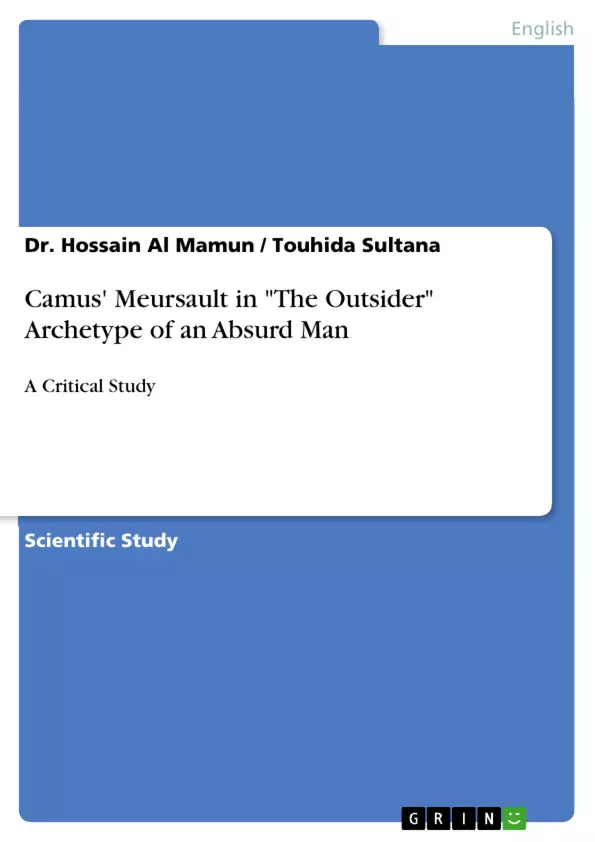This paper explores Camus' Meursault’s brusque mannerisms that lead to society judging him and ultimately hating him, as he is judged to be a threat. Meursault did not care about anything or anybody, but himself, and his own little pleasures and the necessities of the moment. He has no feelings, does not care to "advance” his life in the same way that others expect. It demonstrates how Meursault is a rebel in the eyes of society by his actions and upholds him as the archetype of an absurd man.
Table of Contents
- Introduction
- Meursault's Indifference and the Absurd
- Meursault's Relationships and Lack of Emotional Engagement
Objectives and Key Themes
This paper aims to explore Meursault's character in Albert Camus' The Outsider, analyzing his detached behavior and its consequences within the societal context. The analysis focuses on how Meursault embodies the archetype of the absurd man as defined by Camus.
- Meursault's emotional indifference
- The concept of the absurd in Camus' philosophy
- Meursault's societal alienation
- The portrayal of death and grief in the novel
- Meursault's resistance to societal norms
Chapter Summaries
Introduction: This introductory section lays the groundwork for the analysis by highlighting Meursault's unconventional behavior and the societal judgment it incurs. It posits Meursault as a rebellious figure who challenges conventional expectations, thus embodying the archetype of an absurd man. The introduction briefly touches upon Sartre's interpretation of Camus' work, emphasizing the "experience of the absurd" as a central theme.
Meursault's Indifference and the Absurd: This section delves into Meursault's profound emotional detachment. The analysis uses specific examples from the novel, such as his reaction to his mother's death, to illustrate his lack of conventional emotional responses. His apathy extends beyond familial relationships to his interactions with others, including Marie and his friends. This detachment is framed within the context of Camus' philosophy of the absurd, emphasizing Meursault's acceptance of life's inherent meaninglessness.
Meursault's Relationships and Lack of Emotional Engagement: This section explores Meursault's relationships, highlighting his superficial connections with Marie, Emmanuel, Raymond, and Salamano. The analysis examines how these relationships lack depth and emotional investment, reflecting his overall indifference. His interactions are analyzed to demonstrate his inability to connect meaningfully with others on an emotional level, further solidifying his portrayal as an absurd man who rejects societal expectations of emotional expression and engagement.
Keywords
Meursault, Albert Camus, The Outsider, Absurd, Archetype, Indifference, Existentialism, Societal Alienation, Emotional Detachment, Rebel
Frequently Asked Questions: Albert Camus' *The Outsider* Analysis
What is the purpose of this document?
This document provides a comprehensive preview of an academic analysis of Albert Camus' The Outsider. It includes the table of contents, objectives, key themes, chapter summaries, and keywords, offering a structured overview of the paper's content.
What are the main themes explored in the analysis of *The Outsider*?
The analysis focuses on Meursault's character, exploring his emotional indifference, his embodiment of the absurd, his societal alienation, his portrayal of death and grief, and his resistance to societal norms. The concept of the absurd in Camus' philosophy is a central theme.
What are the key chapters and their summaries?
The analysis includes an introduction laying the groundwork for the analysis by highlighting Meursault's unconventional behavior and societal judgment. A chapter on Meursault's indifference and the absurd delves into his emotional detachment, using examples from the novel. Another chapter examines Meursault's relationships and lack of emotional engagement with others, emphasizing the superficiality of his connections.
What are the key objectives of the analysis?
The analysis aims to explore Meursault's character, analyzing his detached behavior and its consequences within the societal context. It focuses on how Meursault embodies the archetype of the absurd man as defined by Camus.
What are the keywords associated with this analysis?
The keywords include Meursault, Albert Camus, The Outsider, Absurd, Archetype, Indifference, Existentialism, Societal Alienation, Emotional Detachment, and Rebel.
What is the scope of the analysis concerning Meursault's relationships?
The analysis examines Meursault's relationships with Marie, Emmanuel, Raymond, and Salamano, highlighting the lack of depth and emotional investment in these connections. It demonstrates his inability to connect meaningfully with others on an emotional level.
How does the analysis relate Meursault to Camus' philosophy of the absurd?
The analysis frames Meursault's emotional detachment and rejection of societal norms within the context of Camus' philosophy of the absurd, highlighting Meursault's acceptance of life's inherent meaninglessness.
What is the significance of Meursault's reaction to his mother's death in the analysis?
Meursault's reaction to his mother's death is used as a key example to illustrate his lack of conventional emotional responses and his profound emotional detachment.
How does the introduction relate to Sartre's interpretation of Camus' work?
The introduction briefly touches upon Sartre's interpretation of Camus' work, emphasizing the "experience of the absurd" as a central theme.
- Citar trabajo
- Dr. Hossain Al Mamun (Autor), Touhida Sultana (Autor), 2011, Camus' Meursault in "The Outsider" Archetype of an Absurd Man, Múnich, GRIN Verlag, https://www.grin.com/document/212190



